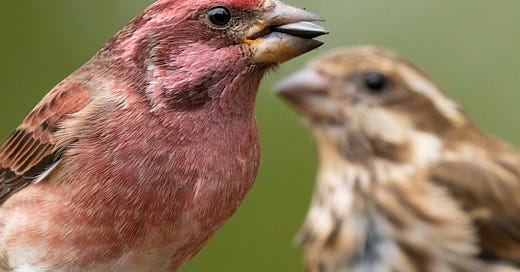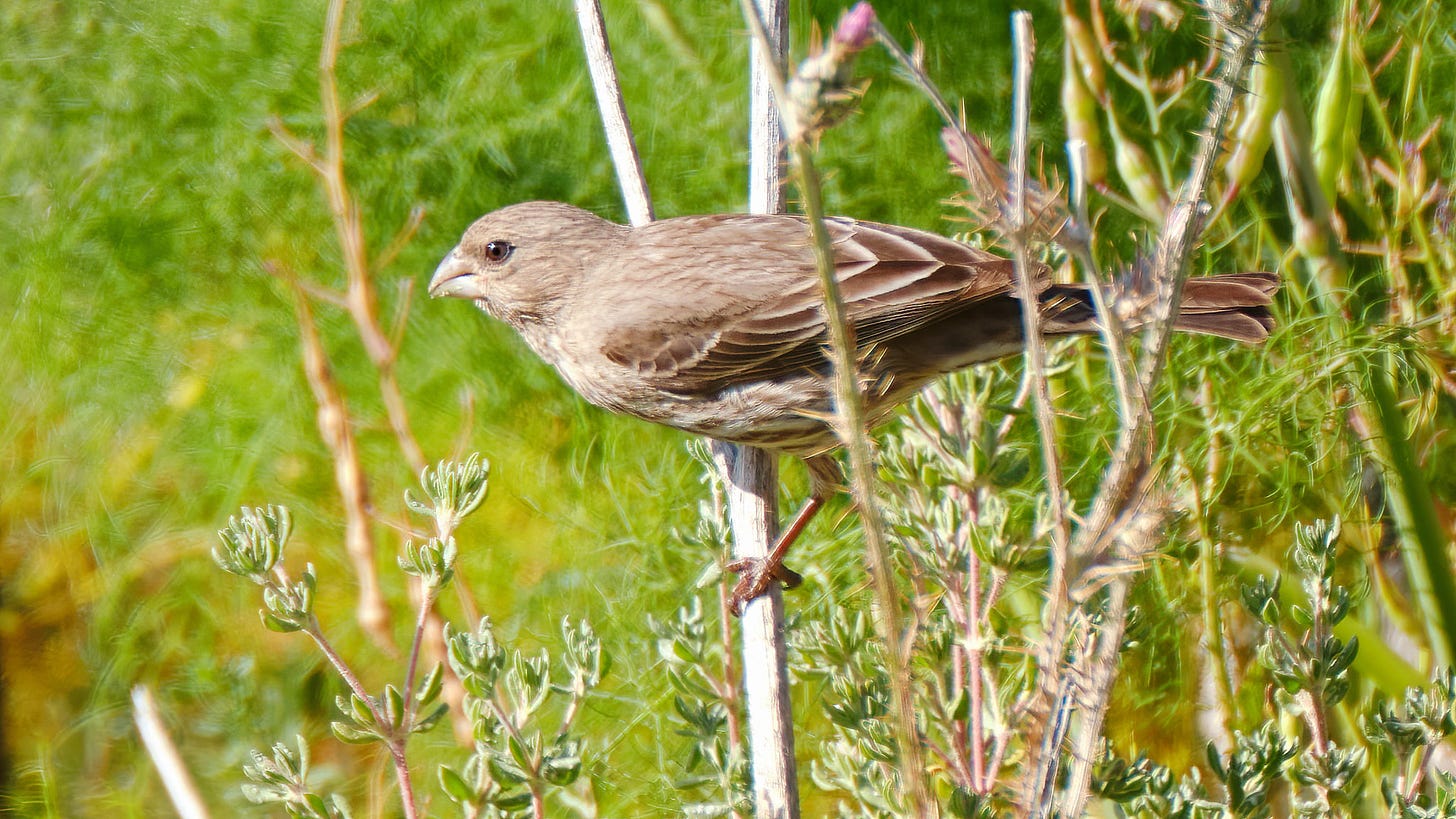Bird of the Week: House Finch
They're the 'opera singers of the bird world' — and they have a criminal past!
Today's Bird of the Week comes from what is fast turning into one of my most reputable and enduring sources for bird material: the Crosbie family.
I recently featured the hoatzin, a bird suggested to me by Paul Crosbie, aka Jack Crosbie's dad. You'll never guess what happened next: Cros's mom got in touch!
Here is part of the very convincing note that Laurie Crosbie sent me (emphasis mine):
Have you already written about the common house finch? The call and response of male and female songs are so beautiful I consider them the opera singers of the bird world. They build nests (or come back to the old ones) on top of our small patio stereo speakers each spring. They are dowdy, except for the males' red breasts when they turn toward the light.
The "opera singers of the bird world!" Pure poetry, Laurie! Before we dive into the particulars, let's just get a look at them:
Lovely! The male finches aren't always that red, but the one in that picture is, so there.
Now, a great many of us have probably seen and heard a house finch. They're all over the place—reportedly the most common songbird in North America. They used to be only in the west, but then something...happened. From Audubon:
New York pet shop owners, who had been selling the finches illegally, released their birds in 1940 to escape prosecution; the finches survived, and began to colonize the New York suburbs. By 50 years later they had advanced halfway across the continent, meeting their western kin on the Great Plains.
Apparently, they were selling the birds under the title "Hollywood finches," but an upstanding bird enthusiast smelled a rat—or, I suppose in this case, a bird—and tipped off the Audubon Society, which then ran a sting operation to expose the crooked trade. I am not making this up! Again from the Audubon people:
Once Audubon got involved, a whole secret ring of House Finch shipments from California to pet stores on the East Coast was discovered. Undercover Audubon operatives arranged fake transactions of birds—$35 for a lot of 100—to catch criminals in the act. It was eventually determined that about 100,000 House Finches had been captured in California and shipped east.
This is the most New York story I have ever heard???? Scurrilous NYC pet shop owners accidentally flooding a continent with illegally trafficked birds because the law was on their heels is like a weird lost Damon Runyon plot come to life.
Finches were able to spread so thoroughly because they are highly adaptable, good around people, and feed on things like berries and nuts and seeds that are everywhere (and that humans can give them). Perhaps it is also because we like having them around—and here is where this all comes full circle, and we listen to the finch's glorious song, per Laurie's instructions.
Finches love to sing! The male house finches sing throughout the year, and the females less so. Their song can send people into rhapsodic joy, as in this dispatch from writer Jack Gedney (who uses an antiquated word, "linnet," that is interchangeable with "finch" here):
What does it sound like? The main currents are composed of warmly bubbling warbles, rapid runs of different notes too fast to count or separate. Several birds have songs that could similarly be classed as cheerful warbles, but the linnets have a special closing tag to help you hear them. They often end their phrases with a loud, buzzy, upward-slurring “veeeer!” The song rambles on for a few pleasant seconds and then dispels your doubts as to its author: tayo tayo tatitata teeyee teetoo titi ti-VEEEER!
VEEEER! Beautiful. Let's listen. Laurie was right—their song really is wonderful.
I like this last one the best, because the song is so beautiful and the male finch's dedication to keeping the female finch entertained is so charming. But really, everything about this little bird is charming! Bravo to the house finch! Thanks to the criminal pet store syndicate that brought them into so many of our lives. And thank you Laurie for suggesting them!
A reminder: you can check out our complete Bird of the Week list here, and get in touch with your bird suggestions at hello@discourseblog.com.






